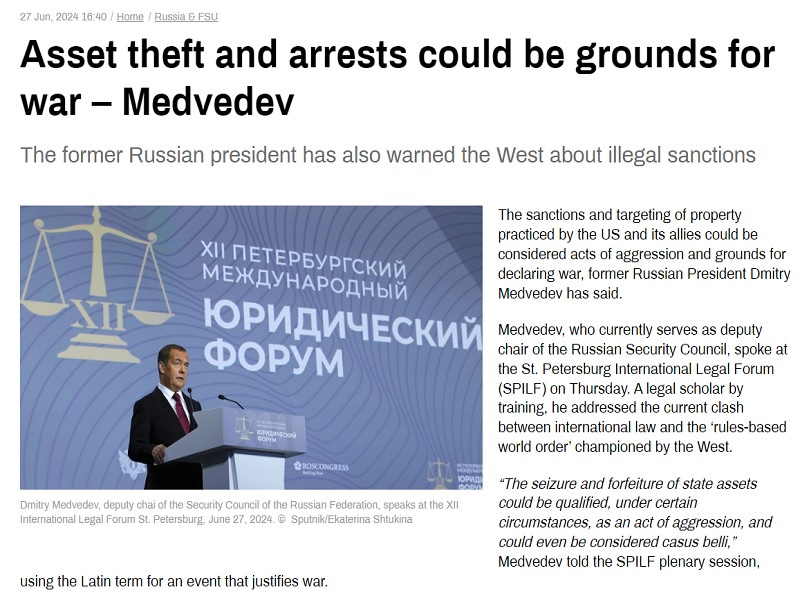Seizing funds is completely different than arresting an official, but neither would be possible without the targeted state taking risks by investing them abroad and having those figures travel to ICC-compliant countries in the first place.
Former Russian President and incumbent Deputy Chair of the Security Council Dmitry Medvedev claimed during his speech at last week’s St. Petersburg International Legal Forum that the seizure of a country’s assets and arrest of its officials abroad could be considered casus belli. He was referring to the approximately $300 billion worth of Russian funds that the West froze in 2022 and the “International Criminal Court’s” (ICC) “arrest warrants” for President Putin and other Russian officials.
He's half-right and half-wrong though for the reasons that will now be explained. On the one hand, both actions are aggressive and aimed at harming the targeted state, but it’s really only the arrest of its officials that could foreseeably lead to the outbreak of conventional hostilities. After all, Russia didn’t even reciprocally seize an equivalent amount of Western assets within its jurisdiction after its own were seized in the West, though that was a wise move in order to maintain international confidence.
Had Russia done the exact same thing as the West, then countries across the world could fear that Russia might one day seize their assets too in the event of a crisis, exactly as they now suspect that the West could do and is why Russia is correct in claiming that this move harmed the West’s reputation. In any case, the point is that Russia didn’t consider the seizure of its assets in the West to be grounds for war since it still hasn’t responded to it, thus rendering Medvedev’s claim little more than rhetoric.
He’s spot-on though about how the arrest of a country’s officials could easily constitute that since it’s impossible to imagine Russia or anyone else not meaningfully responding if their head of state or top military leaders were arrested abroad. The US or whoever it may be that arrests those figures would obviously know the consequence that this would entail, but likewise, so too should those figures have known the risks that they face by traveling to countries where that could happen.
The same can be said about Russia keeping $300 billion worth of assets in the West, which were always at risk of being frozen and seized in the event of a crisis, but they still remained there because it was profitable and policymakers thought that nothing would happen to them. In their minds, the West wouldn’t ever touch those funds due to the self-inflicted reputational damage that would ensue as was explained, which was obviously a miscalculation even if it was made innocently enough.
Nevertheless, seizing funds is completely different than arresting an official, but neither would be possible without the targeted state taking risks by investing them abroad and having those figures travel to ICC-compliant countries in the first place. Medvedev’s general point though is solid, which is that unconventional acts of aggression can be considered casus belli, but only the arrest of officials (regardless of how ill-thought-out their travel plans may be) would likely constitute a militant response.




"Had Russia done the exact same thing as the West, then countries across the world could fear that Russia might one day seize their assets too in the event of a crisis..."
According to this, as of 2022 Russia already froze about $500B in western assets. Froze not stole, which is how the West describes their own actions, so quid pro quo.
https://dzen.ru/a/ZdytqOmznikvZEoy?ysclid=ly2qrkem7o356711262
I don't think a retaliatory measure casts doubt on the safety of assets belonging to nations that aren't provoking Russia, and I don't think they'd read it that way. These days your money's much safer in a Russian, Chinese or even Iranian bank than in any western bank I would argue.
To give you an idea of how banks operate in North America, back in 2000 I had trading accounts in the US because their commissions were cheaper and my trades were all on the US market. Well, the Canadian brokerages (all owned by the big banks) petitioned the Canadian regulators to lean on the US brokerages to chase us out. I moved my accounts twice to avoid this, but they eventually leaned on Finserv which clears most US trades, and that was the end of that. I can't open a brokerage account in the US now, even though there's clear language in both NAFTA and the GATT that says I can. Of course these days if you protest government overreach in Canada you'll have your bank account frozen, so you can't pay the rent or buy food.
This is a good analysis and it makes sense. Law often does not make sense. Most international law practitioners have said at some point that "there's no such thing as international law." When the parties subject to a legal regime abuse it and apply increasingly tortured definitions and rulings to satisfy their political ambitions, it disintegrates to uselessness and the subjects of the nations that do this are thrust into lawlessness. We are witnessing that in the US on a grand scale. Casus belli is not covered in any treaties to the best of my very limited knowledge on this subject. In legal terms, it doesn't really exist. In practical terms, it is whatever the bully du jour on the international scheme says it is. Moses came down with a tablet and people have been disrespecting it since that day.